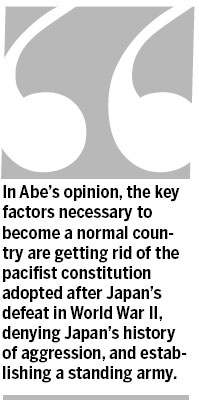More belligerent Japan on the cards
Updated: 2013-07-31 07:40
By Xing Guangmei (China Daily)
|
|||||||||||

Abe may use favorable parliament to push for revising pacifist constitution and boosting military capabilities
Japan's Vice-Foreign Minister Akitaka Saiki visited China on Monday and Tuesday, which was widely interpreted by Japanese and Western media as a sign of Prime Minister Shinzo Abe's willingness to try and sweeten the soured ties with China.
However, the triumph of the hawkish Abe in the upper house election has caused anxiety in East Asia, as he has made it clear he wants to revise the country's pacifist constitution and bolster Japan's military. Many Japanese politicians are expecting him to visit the controversial Yasukuni Shrine on Aug 15, which will deeply offend Japan's neighbors - as Abe well knows.
The decisive victory for the ruling coalition of Abe's Liberal Democratic Party and the New Komeito party in the upper house election brought an end to the longstanding political mess that has existed since 2006, giving the coalition a majority in the parliament and setting the stage for a stable government in the coming years.
Abe's skillful political maneuverings helped ensure victory for the coalition. For example, in order to canvass support for the LDP in the election, Abe made an "inspection tour" to two small islets close to the disputed Diaoyu Islands in the East China Sea, where he vowed that he would "never make concessions" over the "sovereignty" of the islets. By holding high the banner of so-called patriotism and nationalism, Abe is in the vanguard of the right-turning momentum in Japanese society, which was further endorsed by voters in the election. Strong public support lays a good foundation for the Abe administration to continue to pursue its militarist national strategy.
The Japanese public's main concern is the country's economic recovery, followed by protecting Japan's "territorial sovereignty" and maritime rights and interests, and then achieving the "Japanese dream" of making Japan a "normal country". Among them, economic recovery is the fundamental factor which will determine the stability and longevity of the Abe cabinet. To maintain Japan's "territorial sovereignty" and "maritime rights and interests" is regarded not only as a way to achieve Japan's "ocean state" strategy, but also a way to build Japan into a military and political power. To become a "normal country" is the goal that leads the direction of Abe's ruling.
In Abe's opinion, the key factors necessary to become a normal country are getting rid of the pacifist constitution adopted after Japan's defeat in World War II, denying Japan's history of aggression, establishing a standing army, resuming the right to collective self-defense and even becoming a permanent member of the United Nations Security Council.
The Abe administration will on the one hand actively leverage economic and trade cooperation with China to develop the Japanese economy, and on the other hand it will get tough with China over territorial disputes in the East China Sea.
Abe vowed that he would never make concessions over the "sovereignty" of the Diaoyu Islands, and is seeking to enable Tokyo's Self-Defence Forces to launch pre-emptive strikes at so-called enemy bases, while proposing that top-level talks with China should be held soon and without preconditions.
He is trying to blame China for the rising tensions, while in fact it is his administration that has soured Sino-Japanese relations. By recommending the establishment of its version of a Marine Corps, holding US-Japan joint military exercises on a regular basis, strengthening deployment of troops in the southwest to protect "its outlying islands", improving its military intelligence gathering capabilities, early warning, surveillance, emergency mobility and flexible response, Tokyo is making military preparations to forcibly occupy the Diaoyu Islands.
If maintaining "its maritime rights" in the East China Sea hinders its economic recovery, Japan will probably prioritize the economy and reduce the frequency and severity of its provocative actions, but it will still focus on achieving effective control over the Diaoyu Islands and exclusive jurisdiction of the sea areas claimed by Japan.
Japan, of course, wants to have it both ways; it wants to share in the dividends from China's economic growth, while maintaining a hardline stance in its relations with China. It is therefore extremely unlikely that there will be any dtente in bilateral relations during Abe's term in office. Sino-Japanese relations face a grim test in the coming years.
A huge variable in the dispute between China and Japan in the East China Sea is Washington's position and changes in its actions. These changes are mainly subject to the United States' overall interests, which is to prevent a union between Beijing and Tokyo, create and maintain certain disputes between China and Japan, while keeping Sino-Japanese disputes under control.
The US, therefore, acts as the occasion demands, sometimes taking sides with Japan, sometimes with China.
If Japan goes too far in denying history, violates the international consensus, or shows clear ambition in breaking away from the US and pursuing political independence, the US will try to contain Japan; if China's development makes the US feel its hegemony is being challenged, then the US will continue to use Japan to try and contain China. The building of a new type of power relationship between China and the US will help to alleviate the above-mentioned contradiction and confrontation and ease the tense security situation in the Asia-Pacific region.
The author is a law researcher with the Naval Research Institute of the People's Liberation Army.
(China Daily 07/31/2013 page8)
Today's Top News
Israelis, Palestinians will meet again soon: Kerry
Apple faces more staff abuse charges
Japan diplomat seeks to mend ties
Beijing and Canberra to resume trade talks
Top leader vows to meet growth target
PBOC repo move to ease concerns
China expected to rise in luxury travel market
2,290 disciplined for extravagance
Hot Topics
Lunar probe , China growth forecasts, Emission rules get tougher, China seen through 'colored lens', International board,
Editor's Picks

|

|

|

|

|

|





